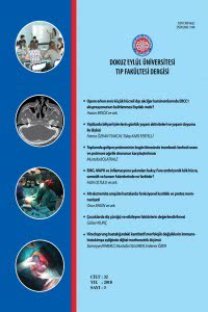Kronik Hastalıklar, Hastaneye Yatış ve Çocuk
Kronik hastalık, hastaneye yatış, duygusal tepki, çocuk ve ergen
CHRONIC ILLNESS, HOSPITALIZATION AND CHILD
Chronic illness, hospitalization, emotional reaction, child and adolescent,
___
- 1. Cadman D, Boyle M, Szatmari P, Offord DR. Chronic illness, disability, and mental and social well-being: Findings of Ontorio Child Health Study. Pediatrics 1987; 9: 805-813.
- 2. Lask B. Modern Approaches North America içinde M Rutter, E Taylor, L Hersov (eds) Paediatric Liaison Work. Child and Adolescent Psychiatry, Modern Inc, Blackwell Science Cambridge, 1994; 996-1005.
- 3. Taylor DC, Eminson DM. Modern Approaches North America içinde M Rutter, E Taylor, L Hersov (ed), Psychological Aspects of Chronic Physical Sickness, Child and Adolescent Psychiatry, Blackwell Science Inc, Cambridge, 1994;737-748.
- 4. Fritz GK. Child and Adolescent mental Health in Consultation in hospitals,schools and courts içinde Fritz GK, Mattison RE, Nurcombe B, Spirito A(eds)Common clinical problems in pediatric consultation, 1993 American Psychiatric Pres Washington DC, 47-65.
- 5. Cole RE, Reis D. How do families cope with chronic illness? Lawrence Erlbaum, Hillsdale (NJ) 1993.
- 6. Fritz GK, Brown LK. Textbook of Child and Adolescent Psychiatry içinde Concept and Classification of Psychosomatic Disorders, Wiener JM (ed). 1991 American Psychiatric Pres Washington DC, 422-430.
- 7. Fritz GK, Rubenstein S, Lewinston NJ. Psychological factors in fatal childhood astma. Am J Orthopsychiatry 1987;57:253-257.
- 8. 8.Mattison A. Long-term physical illness in childhood:a challenge to psychosocial adaptation. Pediatrics 1972; 52:801-811.
- 9. Drell MJ, Hanson White TJ. Comprehensive Textbook of Psychiatry içinde HI Kaplan, BJ Sadock (ed), H Aydın, A Bozkurt (çeviri ed) Çocukların Hastalık ve Hastaneye Yatırılmaya Tepkileri Cilt 4, Güneş Kitabevi; Ankara 2007;3425-3433.
- 10. Baykara A, Güvenir T, Miral S. Ben Hasta Değilim-Çocuk Sağlığı ve Hastalıklarının Psikososyal Yönü içinde, A Ekşi (ed) Hastalık ve Hastaneye Yatışın Çocuk Üzerine Etkisi Nobel Kitapevleri, İstanbul, 1999;374-378.
- 11. Schonfeld DJ. A Comprehensive Textbook içinde, M Lewis (ed) The child’s Cognitive Understanding of Illness. Child and Adolescent Psychiatry: Williams and Wilkins, Baltimore, 1996; 943-947.
- 12. LeBlanc LA, Goldsmith T, Patel DR. Behavioral aspects of chronic illness in children and adolescents. Pediatric Clinics of North America 2003;50:859-878.
- 13. Lock J. Psychosexual development in chronic medical illness. Psychosomatics 1998;39: 340-349.
- 14. Gökler B. Ben Hasta Değilim-Çocuk Sağlığı ve Hastalıklarının Psikososyal Yönü içinde, A Ekşi (ed). Ölümcül Hastalık Karşısında Çocuk, Aile ve Hekim. Nobel Kitabevleri, İstanbul, 1999;471-475.
- 15. Ekşi A. Ben Hasta Değilim-Çocuk Sağlığı ve Hastalıkları- nın Psikososyal Yönü içinde, A Ekşi (ed) Fiziksel Hastalığı Olan Çocuk ve Adolesanlara ve Hastanede Refekat Kalan Annelere Psikolojik Yaklaşım Nobel Kitapevleri, İstanbul, 1999;620-630
- 6. Rosenbaum P. Some psychosocial interventions can help children and families cope with chronic health conditions. Evidence Based Mental Health 1998;1: 48-48.
- 17. Patterson J, Blum RW. Risk and resilience among children and youth with disabilities. Archives Pediatric Adolescent Medicine 1996;150: 692-698.
- 18. Britto MT, Garrett JM, Duglis MA et al. Risky behavior in teens with cystic fibrosis or sickle cell disease. Pediatrics 1998;101: 250.
- 19. Vigneux A. Review: some psychosocial interventions can help children and families copewith chronic conditions. Evidence Based Nursing 1998;1: 43-43.
- 20. Lock J. Psychosexual development in chronic medical illness. Psychosomatics 1998;39: 340-349.
- 21. Sawyer MG, Streiner DL, Antoniou G, Toogood I, Rice M. Influence of parental and family adjustment on the later psychological adjustment of children treated for cancer. Journal of American Academy Child and Adolescent Psychiatry 1998;37: 815-822.
- 22. Perrin JM, MacLean WE Jr. Children with chronic illness. The prevention of dysfunction. Pediatric Clinics of North America 1988;35: 1325-1337.
- 23. Costello EJ, Edelbrock C, Costello AJ, Dulcan MK, Burns BJ, Brent D. Psychopathology in pediatric primary care: the new hidden morbidity. Pediatrics 1998;82: 415-424.
- 24. Black D. Modern Approaches North America içinde Rutter, E Taylor, L Hersov (ed) Psychological Reactions to Life Treatening and Terminal Illnesses and Bereavement. Child and Adolescent Psychiatry, M North America Blackwell Science Inc, Cambridge 1994; 776- 793.
- 25. Roberts MC, Wallander JL Family issues in pediatric psychology. Lawrence Erlbaum, Hillsdale (NJ) 1994. 26. Jacobs P, Mc Dermott S. Family caregiver costs of chronically ill and handicapped children: method and literature review. Public Health Reports 1989; 104:158- 163.
- 27. Meleksi DD. Families with chronically ill children. American Journal of Nursing 2002;102: 47-54.
- 28. Campbell C, McGauley G. Doctor-patient relationships in chronic illness: insights from forensic psychiatry. British Medical Journal 2005;330:667-670.
- 29. Pless IB, Cripps HA, Davies JM, Wadsworth ME. Chronic physical illness in childhood: psychological and social effects in adolescence and adult life. Developmental Medicine Child Neurology 1989; 31:746-755.
- 30. Ireys HT, Chernoff R, DeVet KA, Kim Y. Maternal Outcomes of a Randomized Controlled Trial of a Community-Based Support Program for Families of Children With Chronic Illnesses. Archives of Pediatrics and Adolescent Medicine 2001;155: 771-777.
- 31. Bauman LJ, Drotar D, Leventhal JM, Perrin EC, Pless IB. A review of psychosocial interventions for children with chronic health conditions. Pediatrics 1997;100: 244-251.
- 32. Kelly AF, Hewson PH. Factors associated with recurrent hospitalization in chronically ill children and adolescents. Journal of Pediatric Child Health 2000;36: 13-18.
- 33. Von Korff M, Glasgow RE, Sharpe M. Organising care for chronic illness. British Medical Journal 2002; 325: 92-94.
- ISSN: 1300-6622
- Yayın Aralığı: 3
- Başlangıç: 2015
- Yayıncı: -
Gen Transferi-Transfeksiyon Prostat Kanseri STAMP2 Stabil Hücre Hattının Oluşturulması,
Rektus Abdominis Kasında Endometriyozis, Olgu Sunumu
Hale GÖKSEVER, Erbil DOĞAN, Mürüde DAĞDELEN, C. Onur TUNK
İskemi-reperfüzyon ve kanser metastazı: Biyokimyasal bakış
Ferhat Can ÖZKAYA, Hilal KOÇDOR
Anastomosis between the temporal branch of facial nerve and auriculotemporal nerve
Funda AKSU, Gülriz Nazlı ÇERİ, Candan ARMAN, Süleyman TETİK
Gen transferi-transfeksiyon Prostat kanseri STAMP2 stabil hücre hattının oluşturulması
Anastomosis Between The Temporal Branch Of Facial Nerve And Auriculotemporal Nevre,
F. AKSU, N. G. ÇERİ, C. ARMAN, S. TETİK
Adneksiyal kitleli hastaların tedavisinde laparoskopinin güvenilirliği
Gül Nihal TOKSÖZ, H. Gürsoy PALA, Pınar KARABACAKOĞLU, R. Emre OKYAY
F. GÖDE, E. DOĞAN, B. SAATLI, C. POSACI
FUNDA GÖDE, Erbil DOĞAN, Bahadır SAATLİ, Cemal POSACI
